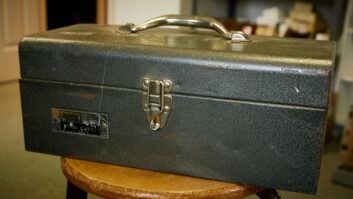The Case of the Modulated Maytag
Dec 1, 2001 12:00 PM
It had been two weeks, and Mrs. Nelson still didn’t know what the noise was or where it came from; the thump�chink�thump�chink� that seemed to come from nowhere. At first she was certain it was in the kitchen. Then she was sure it was the guest bedroom. Then it was the kitchen again. The noise seemed to move around, and it came and went at its own whimsy. Each morning she told Mr. Nelson about the noise, but the unmistakable rhythm was never beating in the early morning when he left for his job at the steel mill or in the evening when he returned.
Across town, in a nice two-story building near downtown Birmingham, AL, WAPI-AM 1070 chief engineer Frank Giardina was showing a new staff engineer how to switch from the 50kW daytime power to the 5kW directional night parameters authorized by the FCC. Next to the remote control was a chart showing local sunrise and sunset times for the next few months.
Beautiful weather was in the forecast when Mrs. Nelson told her husband she wanted to stay home all weekend instead of making the usual trip to the lake. She had determined that the noise only came during the day when Mr. Nelson was at work. In fact, it seemed to come and go with the sun. This weekend, she wanted him home during the day. Maybe he would finally get to hear it. Reluctantly, Mr. Nelson agreed.
Sometime during the course of the weekend, and before the tree fell, the Nelsons determined that the noise was coming from the laundry room, which was just outside the kitchen.
On Monday morning, Giardina looked through the scrapbook someone had made for the station’s sixtieth birthday, full of old newspaper clippings and photographs. Those people sure look funny, he thought. But then, WAPI signed on in September of 1922, some 4-� years before Congress created the Federal Radio Commission.
Giardina came across a 1952 picture of some of the early air talent heard on WAPI: Lum �n� Abner, Burns and Allen, Amos �n� Andy, and Baby Snooks. The headline began �Do you remember�� Not really, thought Giardina.
Finally he found what he was looking for: a special radio section of The Birmingham News, dedicated to WAPI at its first sign-on in its present location. This headline said �WAPI Operating Room Interesting.� Boy, can they write �em. The line Giardina was looking for came three-fourths of the way through the article: �Modulation is an important feature, and this has been taken care of by the latest equipment. Harmonics,� the article continued, �are another feature that has been �well taken care of.�� Giardina thought that this would be great material for the SBE chapter newsletter, but he was about to find something that would be even more newsworthy later that day.
It was just about then that Giardina’s phone rang. It was Mrs. Nelson, muttering something about a tree and a fence. It seems that Mrs. Nelson lived just behind WAPI’s 50kW AM transmitter site. One of the station’s trees had fallen on her fence during the storm that had preempted the weekend’s beautiful weather. She was calling to find out what Giardina was going to do about it.
When he arrived at the site, he found that a large pine tree had crumpled a portion of the fence. Pinecones and needles were everywhere, accompanied by the sweet scent of Southern pine in the air. Giardina went to the house to see Mrs. Nelson and found her talking on the telephone. When she finished, she mentioned that she could hear his radio station on the phone all day long.
They sat down to have a cup of coffee while Giardina related, in layman’s terms, the story of how high concentrations of RF can do all sorts of strange things. He was telling her about the locks on his doghouse gates that play music during the day while the station runs at 50kW, when Mrs. Nelson had an idea. �Can it play music on washing machines?� she wondered.
When Giardina accompanied Mrs. Nelson to the laundry room, he heard the noise, the source of which had long eluded Mr. and Mrs. Nelson. She demonstrated how the noise would stop when the lid was touched and start again when it was let go. Likewise, the sound would stop when the lid was open and continue when the lid was closed. Always the same thump�chink� thump�chink. And always only during the day.
Another mystery solved. Just a typical day in the life of a radio chief engineer. Apparently the oxidation present on the machine’s lid had formed a diode detector � the Nelson’s washer had become a crude crystal radio set.
WAPI took care of the fallen tree. The Nelsons got the firewood and a new fence. WAPI kept the pinecones. Mrs. Nelson and the washing machine are no longer there, but the doghouse locks still sing.
Today, WAPI uses a Harris MW-50 during the day (non-directional) and an MW-10 at running 5kW at night. The MW-10 is also used as a 10kW standby transmitter during the day when needed. The two windmill towers were built by the Battavia Wind Pump Company.












